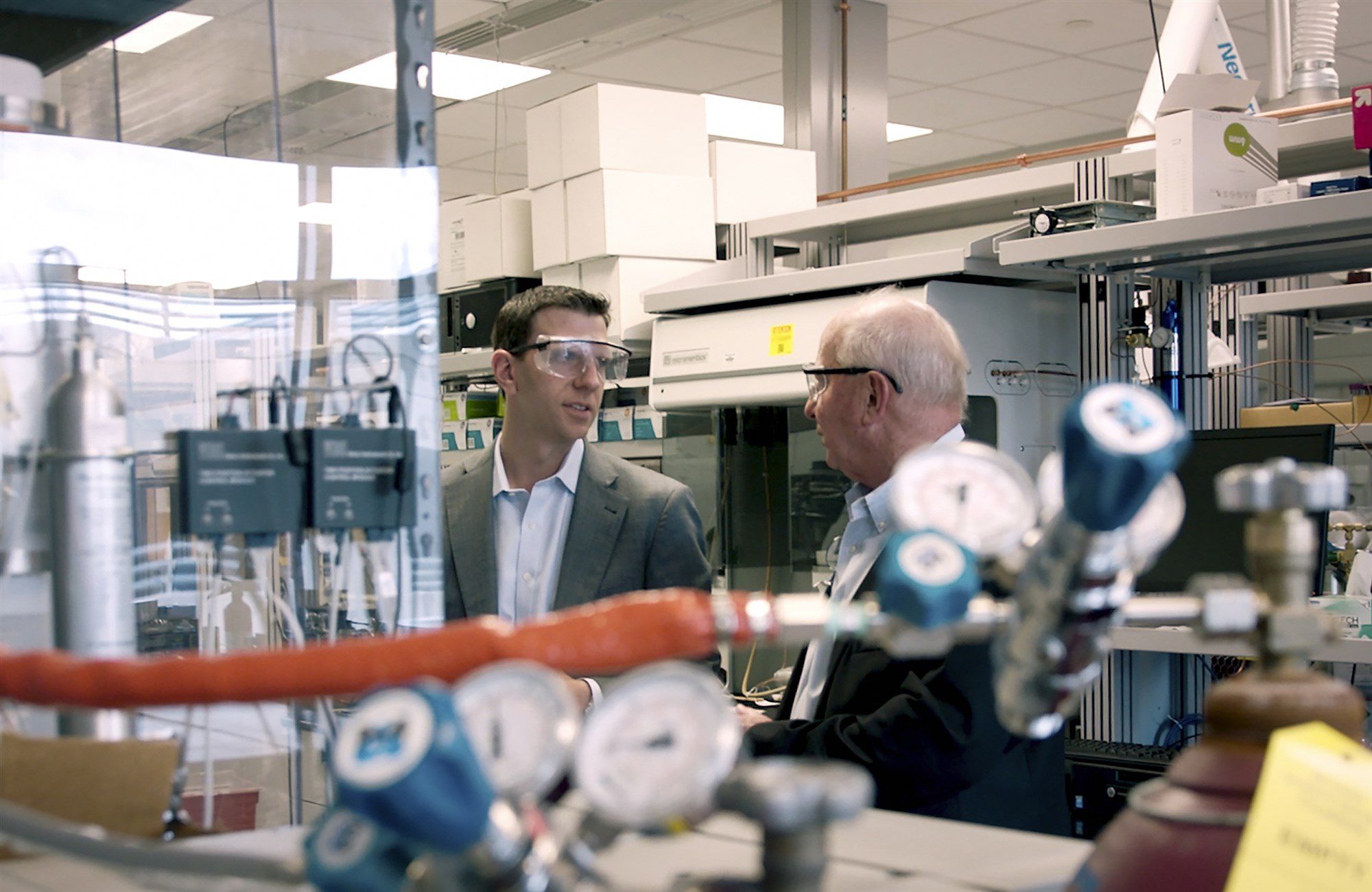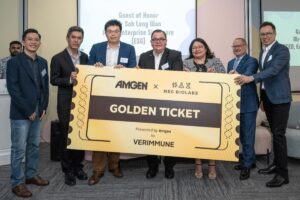
Phlow Corp. CEO Eric Edwards speaks with company co-founder Frank Gupton
Virginia Life Sciences Ecosystem Gets Boost from Essential Medicines-Focused Phlow, Civica Rx
The ongoing COVID-19 pandemic greatly exposed a dearth of essential medications and significant vulnerabilities in the United States medical supply chain. Phlow Corporation aims to mitigate those weaknesses and manufacture essential generic medications at its Virginia manufacturing facility.
In early 2020, little-known Phlow made a splash with an $812 million contract with the Biomedical Advanced Research and Development Authority (BARDA) to manufacture essential medications in the United States. Phlow, along with strategic partners Civica Rx, Virginia Commonwealth University’s Medicines for All Institute, and AMPAC Fine Chemicals teamed up to meet the challenge of ensuring a steady supply of these essential drugs, as outlined by the U.S. Food and Drug Administration, will be available for patients.
COVID-19 exposed a weakness in the U.S. supply chain of many essential drugs, including medicines used for sedation to help patients requiring ventilator support, medicines for pain management, and certain essential antibiotics. Eric Edwards, chief executive officer of Richmond-based Phlow, said many of these medications have been manufactured overseas by non-U.S. companies. When the pandemic hit, governments put a halt on the export of some of these drugs because they anticipated needing them to treat their own citizens who became sick from the novel coronavirus. Approximately 65% of the essential medicines Phlow and its partners expect to work on have an overlap with COVID patient needs.
“This is a game-changing proposition,” Edwards said.
Edwards said the shortage of life-saving medications in the United States is a serious concern. As a first responder in Richmond, Edwards said that was something he experienced when working as medical director for a rescue squad less than a year ago. His team responded to a call to help someone in cardiac arrest. He expected to inject a prepared dose of epinephrine into the patient, but realized that was something not available in their medical kit. Epinephrine has been in short supply since 2018, according to the FDA shortages list. To save the person’s life, Edwards had to quickly compound his own dose of epinephrine from raw materials in his kit.
“Nobody in any country should ever have to worry about whether or not their family members will have to face this kind of shortage,” Edwards said.
More than 150 entries on the FDA’s shortage list of generic drugs are considered essential. The list includes drugs like lidocaine, methadone, ketamine, and many more. Phlow was formed as an answer to this problem in the United States.
As part of the agreement with BARDA, which Edwards called a “shot in the arm” for his company, Phlow will help build the United States’ first Strategic Active Pharmaceutical Ingredients Reserve (SAPIR), a long-term, national stockpile to secure key ingredients used to manufacture the most essential medicines in the United States. Currently, more than 80% of active pharmaceutical ingredients (APIs) and chemical ingredients used to manufacture generic and over-the-counter drugs are produced abroad. The majority of those ingredients are sourced from China and India.
Since its launch, Phlow raised an additional $20 million in a Series A financing round, and earlier this month, Phlow partnered with a coalition of children’s hospitals to provide what Edwards called a certainty in availability and access for key medicines necessary to sustain life and conquer disease and to address the nation’s broken essential medicines supply chain. Edwards said Phlow and the coalition came together to change the way pediatric essential medicines are provided to patients in need.
In addition to Phlow’s rapid growth in Virginia, Civica Rx, a nonprofit generic drug manufacturing company, and a key partner for Phlow, announced in January that it will invest $124.5 million to establish its first in-house pharmaceutical manufacturing operation in Petersburg. Civica will construct a 120,000-square-foot state-of-the-art manufacturing facility adjacent to facilities operated by Phlow and AMPAC. The Civica plant will manufacture vials and syringes of injectable medicines used to treat COVID-19 patients and more general uses, including treatment of infections and hypertension or uses in emergency rooms and surgeries. The Civica manufacturing facility is expected to create 186 new jobs.
Martin VanTrieste, president and CEO of Civica, said the manufacturing site will be instrumental in the efforts to simplify what he called a complex supply channel.
“This is a dream come true for Civica and our hospital partners as we work together to stabilize the supply of quality medicines for patients across the country,” VanTrieste said.
At the time the Civica site was announced, Frank Gupton, co-founder of Phlow, Chair of the Department of Chemical and Life Science Engineering at VCU, and CEO of the Medicines for All Institute, said the collaboration between the organizations is a “major milestone towards the realization of our vision for producing 100 percent of all essential medicines in the U.S.”
With the addition of the Civica site, Phlow’s own facilities, and those of AMPAC, Edwards expects the central region of Virginia will become a hub for advanced manufacturing and help attract highly technical jobs.
Ross Dunlap, CEO of Ceres Nanosciences, who serves on the board of Virginia Bio, echoed Edwards’ thoughts. He said the commonwealth’s ecosystem is showing the fruits of seeds it planted in all parts of the life sciences industry, including biopharma, medical devices, technology, and Ag sciences. He said there is significant space to accommodate additional manufacturing. In fact, Ceres recently opened a new 12,000-square-foot manufacturing facility in Prince William County’s Innovation Park.
“This is an area that’s rapidly growing. We have close proximity to the FDA and other government agencies, as well as other organizations within the hub. Richmond is on the rise,” Edwards said.






